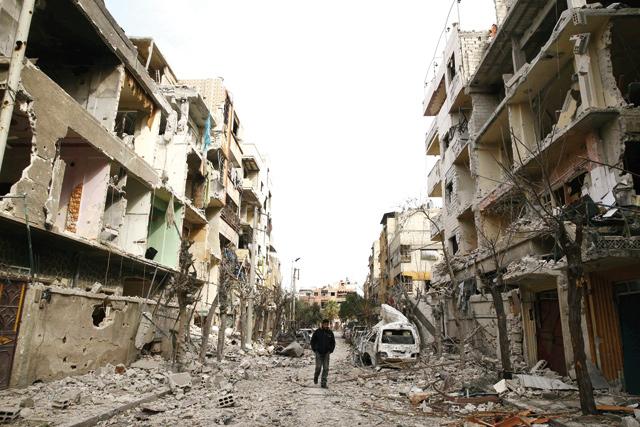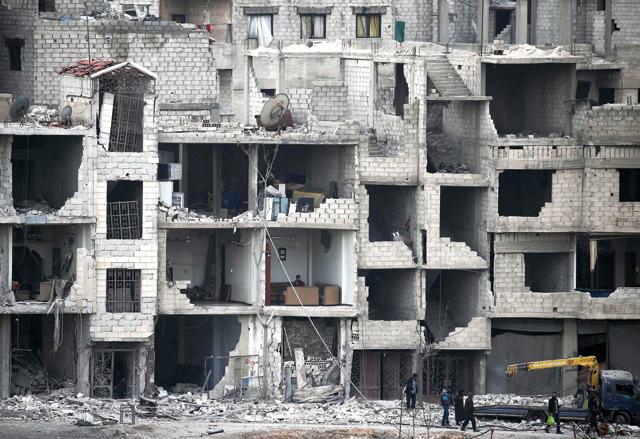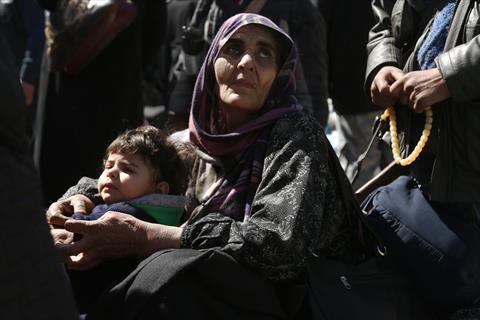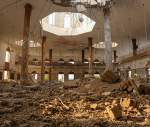You are here
Syria's Ghouta residents ‘wait to die’ as more bombs fall
By Reuters - Feb 22,2018 - Last updated at Feb 22,2018
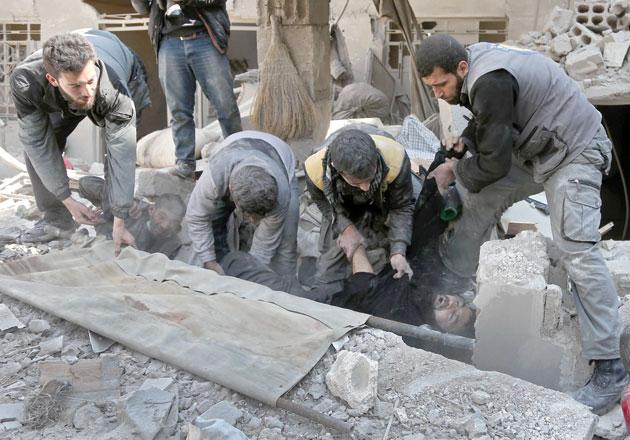
Members of a Syrian civil defence team rescue a man following a reported regime air strike in the rebel-held town of Hammouria, in the besieged Eastern Ghouta region on the outskirts of the capital Damascus, on Wednesday (AFP photo)
BEIRUT — Residents of Syria's Eastern Ghouta district said they were waiting their "turn to die" on Wednesday, amid one of the most intense bombardments of the war by pro-government forces on the besieged, rebel-held enclave near Damascus.
At least 38 people died on Wednesday. At least 310 people have been killed in the district since Sunday night and more than 1,550 injured, the Britain-based Syrian Observatory for Human Rights war monitor said.
The Eastern Ghouta, a densely populated agricultural district on the Damascus outskirts, is the last major area near the capital still under rebel control. Home to 400,000 people, it has been besieged by government forces for years.
A massive escalation in bombardment, including rocket fire, shelling, air strikes and helicopter-dropped barrel bombs, since Sunday has become one of the deadliest of the Syrian civil war, now entering its eighth year.
The Syrian government and its ally Russia, which has backed Assad with air power since 2015, say they do not target civilians and point to rebel mortar fire on Damascus.
"We are waiting our turn to die. This is the only thing I can say," said Bilal Abu Salah, 22, whose wife is five months pregnant with their first child in the biggest Eastern Ghouta town Douma. They fear the terror of the bombardment will bring her into labour early, he said.
"Nearly all people living here live in shelters now. There are five or six families in one home. There is no food, no markets," he said.
Reuters photographs taken in eastern Ghouta on Wednesday showed men searching through the rubble of smashed buildings, carrying blood-smeared people to hospital and cowering in debris-strewn streets.
An air strike warning system run by the Syrian Civil Defence, a rescue service in opposition areas, was by Wednesday afternoon sending alerts every few minutes, triggered when warplanes are spotted taking off from air bases.
“The estimated arrival time for the plane to reach the most bombed parts of Eastern Ghouta: ... Harasta: two minutes from now,” a typical alert sent at 4:41pm said.
Abdullah Kahala, a construction worker, was having breakfast with his wife and six children when a huge explosion shattered the wall. “I saw Hala and Sara lying in blood with their mother hysterical and our other children shell-shocked on the floor,” he said in a voice message.
“Bombs were falling everywhere near our house. We have been spending the last week digging into the rubble of nearby areas with our bare hands,” he added.
Denunciation
The United Nations has denounced the bombardment, which has struck hospitals and other civilian infrastructure, saying such attacks could be war crimes.
UN Secretary General Antonio Guterres appealed on Wednesday for an “immediate suspension of all war activities in Eastern Ghouta”. Speaking to the UN Security Council Guterres said residents were living in “hell on earth”.
Guterres expressed support for a Swedish and Kuwaiti push for the 15-member council to demand a 30-day ceasefire in Syria. Diplomats said the council could vote on a draft resolution in the coming days. But Assad’s veto-wielding ally Russia has called the proposal “not realistic”.
“We can not simply decide that there is a ceasefire. That’s a long and complex process to achieve,” Russian UN Ambassador Vassily Nebenzia told Reuters of the draft ceasefire resolution.
“But we are working on [the draft].”
Moscow on Wednesday called for the UN Security Council to meet publicly on Thursday to discuss the situation in Ghouta.
The pace of the strikes appeared to slow overnight, only to intensify again later on Wednesday, the observatory said. Pro-government forces fired hundreds of rockets and dropped barrel bombs from helicopters on the district’s towns and villages.
The International Committee of the Red Cross (ICRC) called on Wednesday for humanitarian access to Ghouta, especially to reach wounded people in critical need of treatment.
“The fighting appears likely to cause much more suffering in the days and weeks ahead,” said Marianne Gasser, ICRC’s head of delegation in Syria. “This is madness and it has to stop.”
Medical charity Médecins Sans Frontières said on Wednesday 13 hospitals had been hit and damaged or destroyed in the past three days.
A rebel official said there had been attempts to mediate a ceasefire that would stop the bloodshed.
“There are attempts from some international and local sides for a truce process in Eastern Ghouta and they have not succeeded so far,” Mohammad Alloush, the political chief of Jaish Al Islam — one of the main rebel factions in Eastern Ghouta — told Reuters.
Alloush said mediation was taking place between insurgents and Moscow, but did not elaborate.
Alloush ruled out the possibility of any deal to evacuate residents of Eastern Ghouta, a type of negotiated withdrawal to insurgent territory in the north that has helped Damascus regain control of cities across western Syria.
Warnings
Damascus denies using the inaccurate explosive barrel bombs dropped from helicopters whose use has been condemned by the United Nations.
The observatory said many of the planes over Ghouta appear to be Russian. Syrians say they can distinguish between Russian and Syrian planes because the Russian aircraft fly higher.
Kremlin spokesman Dmitry Peskov on Wednesday described as “groundless” accusations that Russia bears some of the blame for civilian deaths in Eastern Ghouta.
A commander in the coalition fighting on behalf of Assad’s government told Reuters overnight the bombing aims to prevent the rebels from targeting the eastern neighbourhoods of Damascus with mortars. It may be followed by a ground campaign.
“The offensive has not started yet. This is preliminary bombing,” the commander said.
Rebels have also been firing mortars on the districts of Damascus near Eastern Ghouta, wounding seven people on Wednesday, state media reported. Rebel mortars killed at least six people on Tuesday.
“Today, residential areas, Damascus hotels, as well as Russia’s Centre for Syrian Reconciliation, received massive bombardment by illegal armed groups from Eastern Ghouta,” Russia’s defence ministry said late on Tuesday.
Eastern Ghouta is one of a group of “de-escalation zones” under a diplomatic ceasefire initiative agreed by Assad’s allies Russia and Iran with Turkey which has backed the rebels. But a rebel group formerly affiliated with Al Qaeda is not included in the truces and it has a small presence there.
Conditions in Eastern Ghouta, besieged since 2013, had increasingly alarmed aid agencies even before the latest assault, as shortages of food, medicine and other basic necessities caused suffering and illness.
“Relatives were searching for their loved ones among the bodies brought to the hospital. There is only the stench of death,” said Khaled Faraj, 27. He has lost his parents and two children in the bombardment, he said.
Related Articles
DOUMA, Syria — New regime air strikes and heavy clashes shook Syria's rebel enclave of Eastern Ghouta on Sunday despite a UN demand for a ce
BEIRUT/MOSCOW — Russia will establish a humanitarian corridor and implement a five-hour daily truce in Syria's Eastern Ghouta, it said on Mo
BEIRUT, Lebanon — The last rebel group fighting in Syria's Eastern Ghouta said on Monday that it was still trying to negotiate an end to the


